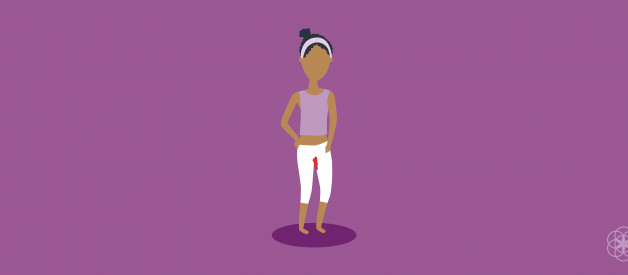By Silvia Maggi, Support Agent at Clue and Jen Bell, Writer at Clue

Free bleeding is the practice of menstruating without blocking or collecting the period flow, and while people have been doing it for centuries, in recent years it has become a subject of public debate.
Why people are still so shocked by blood stains on clothing? Do people who menstruate constantly have to pay attention to avoid making others uncomfortable with our bodies? Do we really need to apologize for our bodily functions?
Some people feel more comfortable simply bleeding onto their clothing rather than using a pad, tampon, or menstrual cup, while others lack access to menstrual products or can?t afford to buy them. Some don?t free bleed all the time, but adopt a more relaxed attitude to their periods by choosing to avoid menstrual products at night or in the shower. And this is nothing new.
There is plenty of speculation about what people used as tampons or pads in ancient times, but not much reliable evidence. Dr. Helen King is one historian who found evidence of women using menstrual rags in ancient Greece. Another historian, Sara L. Read, found that women in 17th-century England with more money and heavier periods wore cut-up rags to soak up their flow, while the majority of women likely used nothing at all (1).
?I have tons of panties with blood marks on them. Sometimes I forget to put a new tampon in after taking out the old one. Once I left a blood mark on a white sofa in a very posh boat at the Venice Biennale. Sometimes I put on jeans with blood marks on the inside, if they are still OK on the outside. It?s not that I have a fetish for blood stains on everything that surrounds me, it?s more that I?m not into making a huge drama about my period. I?m just comfortable with it. I?ve been menstruating for more than 20 years, and I?ll admit that I?m quite punk, very feminist, and I usually date people who menstruate too, which makes things less awkward.? – Silvia
When you hear about free bleeding, you might think ?But what about all that laundry?? But what if we weren?t so obsessed with getting those stains out? Leaks and stains are not a sign of failure. More than just a period practice, free bleeding is a movement focusing on people?s right to menstruate openly and without shame.
The earliest online discussion of free bleeding seems to be a 2004 blog post by Sarah on All About My Vagina, where the author discusses her epiphany about blood stains and how she decided to sometimes abstain from using menstrual products:
?I don?t mind rinsing my panties out in the sink, or getting blood in the sheets now and then. I like not feeling like I have failed somehow when a product leaks?Mainly it is just about being comfortable with menstruation?.I am not lazy! I am not irresponsible! I just think it is ok to overflow sometimes!? – Sarah
In 2012, VICE published a photo series by Emma Arvida Bystrom called ?There Will Be Blood.? It featured portraits of people with period stains on their outfits and lingerie. There was no accompanying text, but the images sparked a big debate, including a 2012 Feministing community post on free bleeding.
In 2014, an anti-feminist prank called Operation Freebleeding was launched via the 4chan website. The misogynistic stunt was quickly outed as a hoax, but ironically it introduced the idea of free bleeding to a larger community. Afterward, writer Kayla Goggin wrote about her experiment with free bleeding:
?It felt great not having a foreign object inside my body to staunch the bleeding, plus my cramps were significantly lighter.? – Kayla Goggin
Then in 2015, drummer Kiran Gandhi, decided to run the London Marathon without using a tampon or pad. Photos of her bloodstained leggings went viral, and her run was covered in publications like the New York Times.
?It would have been way too uncomfortable to worry about a tampon for 26.2 miles?I ran with blood dripping down my legs for sisters who don?t have access to tampons and sisters who, despite cramping and pain, hide it away and pretend like it doesn?t exist. I ran to say, it does exist, and we overcome it every day.? – Kiran Gandhi
Women in the US alone throw away about seven pounds of feminine hygiene products every year, and Gandhi used her high profile to draw attention to those environmental concerns. She was also quick to point out that one of the reasons we don?t have more sustainable products available to us is because we aren?t given the freedom to speak freely and openly about our menstruation experiences.
In many countries menstrual products are taxed as ?luxury items,? and those with low incomes struggle to afford them. Feminine hygiene products are inaccessible for those who are incarcerated, and are one of the most-requested donation items at homeless shelters, according to a recent report by the Los Angeles Times. And many young girls around the world miss school because they lack the resources required to manage their periods.
In 2015, after the UK government declined to repeal a tax on menstrual health items, two feminist activists responded with blood. Charlie Edge organized a protest outside Parliament, writing on Facebook: ?Today, I am foregoing tampons and pads outside the houses of parliament to show how ?luxury? tampons really are.? She and fellow protester Ruth Howarth publicly bled through their white pants to show what it looks like when tampons and pads are out of reach.
That same year, artist and poet Rupi Kaur inadvertently launched a backlash against Instagram when they ?accidentally? removed her period-themed photos, twice.
Then in 2017, transgender period activist Cass Clemmer posted a photo showing a period stain on their pants to highlight that periods don?t just happen to women. Cass has also created a coloring book to illustrate that people of all genders get periods.
There?s nothing unhealthy or medically hazardous about free bleeding, so if you prefer to bleed openly, go for it. But more than just a personal preference, free bleeding can be seen as a call to action for us to openly discuss menstruation, challenge stigma, and consider the health and environmental impacts of our menstrual products. Everyone deserves access to their menstrual products of choice ? or to forgo them, if they prefer.
Track your bleeding with Clue.
References
- Read S. ? Thy Righteousness is but a menstrual clout?: Sanitary Practices and Prejudice in Early Modern England. Early Modern Women. 2008 Oct 1:1?25.


